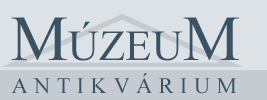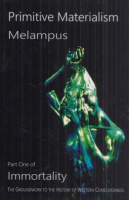categories
- Traffic and Vehicles Catalogue
- socreal.catalog
- Advertisement Catalogue
- Photo Catalogue
- Chinese and Japanese Catalogue
- New Holy Card Catalogue II.
- 12 interesting old books
 Books
Books
 Bibliophil
Bibliophil
 Antiques
Antiques
 Engraving
Engraving
 Maps
Maps
 Photos
Photos
 Antique Papers, Small Prints
Antique Papers, Small Prints
 Posters
Posters
- Circus
- Modern Graphics
- Socialist Realism
- NER Propaganda
- Others
cart
Cart is empty
You've not logged in
Melampus : Primitive Materialism - Immortality, Groundwork to the History of Western Consciousness
- description
- additional information
Part one of Immortality.
Editor: Sigmund Black. Primitive Materialism is a work in philosophical anthropology, the fundamental enquiry into what a human being is. In the wake of a revolution in cognition that took place in Greek Ionia c.600 BCE, Western ideation became bounded by a false dichotomy between appearance and reality that lead to an Either/Or. The thesis is that Western cognition divides into three epochs: primitive materialism; Ionian and Cartesian consciousness; and Kantian consciousness. Primitive Materialism investigates cognition prior to the Ionian revolution and is a history of Greek religion from prehistory to the dawn of the classical period. It propounds a radical thesis regarding the Greek Dark Age, explores the primordial duality of religion between matriarchy and patriarchy, and is an interpretation of Greek myth, including the legend of Troy. It develops a theory of archetypes for Greek mythology. Primitive Materialism is the first of a three-part series: Immortality, The Groundwork to the History of Western Consciousness. The three-part work traces the history of religion from prehistory to the close of the ancient period with regard to the origin and development of Christianity, which became historically bounded by the Either/Or, but has the potential to transcend it. The central concerns are with the metaphysical and ethical issue of immortality, and with the spiritual illness of the West arising from the bounded cognition of the Either/Or. The solution to the crisis of modernity lies in the emergence of a higher state of cognition. Topics discussed within Primitive Materialism include: the shadow problem of split-consciousness; the beliefs of ancient Egypt regarding human identity and life after death; Minoan and Mycenaean religion; the history of the concept of sin; the practice in the ancient world of ritual human sacrifice; the religion of Carthage; scholarly differences regarding the interpretation of Greek religion; the Orphic reformation of the religion of Dionysus during the Greek Dark Ages; Olympian and chthonic religion; the cosmogony of Hesiod; the Zeus theology of Homer; the evolution of the archetype of Heracles; the religion of Sparta. It is also a work of philosophical theology, addressing the moral argument for the existence of God, and propounding the need to understand the godhead, morality and the human mind through understanding of the evolution of consciousness, cognition and religious consciousness in the West.
Editor: Sigmund Black. Primitive Materialism is a work in philosophical anthropology, the fundamental enquiry into what a human being is. In the wake of a revolution in cognition that took place in Greek Ionia c.600 BCE, Western ideation became bounded by a false dichotomy between appearance and reality that lead to an Either/Or. The thesis is that Western cognition divides into three epochs: primitive materialism; Ionian and Cartesian consciousness; and Kantian consciousness. Primitive Materialism investigates cognition prior to the Ionian revolution and is a history of Greek religion from prehistory to the dawn of the classical period. It propounds a radical thesis regarding the Greek Dark Age, explores the primordial duality of religion between matriarchy and patriarchy, and is an interpretation of Greek myth, including the legend of Troy. It develops a theory of archetypes for Greek mythology. Primitive Materialism is the first of a three-part series: Immortality, The Groundwork to the History of Western Consciousness. The three-part work traces the history of religion from prehistory to the close of the ancient period with regard to the origin and development of Christianity, which became historically bounded by the Either/Or, but has the potential to transcend it. The central concerns are with the metaphysical and ethical issue of immortality, and with the spiritual illness of the West arising from the bounded cognition of the Either/Or. The solution to the crisis of modernity lies in the emergence of a higher state of cognition. Topics discussed within Primitive Materialism include: the shadow problem of split-consciousness; the beliefs of ancient Egypt regarding human identity and life after death; Minoan and Mycenaean religion; the history of the concept of sin; the practice in the ancient world of ritual human sacrifice; the religion of Carthage; scholarly differences regarding the interpretation of Greek religion; the Orphic reformation of the religion of Dionysus during the Greek Dark Ages; Olympian and chthonic religion; the cosmogony of Hesiod; the Zeus theology of Homer; the evolution of the archetype of Heracles; the religion of Sparta. It is also a work of philosophical theology, addressing the moral argument for the existence of God, and propounding the need to understand the godhead, morality and the human mind through understanding of the evolution of consciousness, cognition and religious consciousness in the West.
| condition: |      |
| category: | Books > Foreign Language Books > Books in English > |
| category: | Books > Philosophy > |
| category: | Books > Religion > |
| publisher: | Black1s Academy Limited, 2018. Kington, England, |
| item number / ISBN: | 9780992664510 |
| binding: | paperback |
| pages: | 210 p. |
| language: | English |










 Telefon:
Telefon: E-mail:
E-mail:







